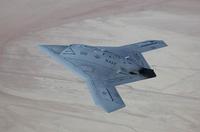-
Obama administration renews drone campaign in Yemen
Responding to intelligence information about planned terrorist attacks by Al Qaeda in the Arabian Peninsula (AQAP), information which led to the closure of twenty-two U.S. embassies in the Middle East and North Africa and a travel warning issued by the Department of State, the Obama administration has launched a series of drone strikes in Yemen over the past ten days.
-
-
Navy uses drones for help with radar, communications

Scientists recently launched unmanned aerial vehicles (UAVs) from a research vessel in a significant experiment that could help boost the U.S. Navy’s radar and communications performance at sea.
Sailing off Virginia Beach, Virginia, from 13 to 18 July, the Office of Naval Research’s (ONR) Research Vessel (R/V) Knorr explored ocean and atmospheric weather variations that can change the angle that radar and radio waves bend, making it more difficult for ships to remain undetected and hindering their ability to communicate or locate adversaries.
-
-
Using invasive trees to develop jet fuel for U.S. Navy fighter jets

In western U.S. rangelands, native juniper and pinyon pine trees are spreading beyond their historical ecological niches and disrupting the environmental balance of their expanded range. Preliminary estimates suggest harvesting some of these hardy invaders every year could supply enough biomass to produce millions of gallons of renewable jet fuel for the U.S. Navy fighter jets.
-
-
Are nuclear weapons safe from cyber-attacks?
Research will look into whether today’s nuclear weapons are safe from computer hacking. Specifically, the research seeks to address the question of whether the ability to use and the confidence in nuclear weapons is being eroded by new cyber capabilities being developed by an increasingly large range of actors.
-
-
New underwater robots mimic designs found in nature
In recent years, robotic underwater vehicles have become more common in a variety of industrial and civil sectors. Now, a new class of underwater robot has emerged that mimics designs found in nature. These “biomimetic” vehicles promise to lead to new underwater technologies that could help the oil and gas industry, underwater humanitarian demining, environmental monitoring, search and rescue operations, anti-terrorist activities, harbor surveillance, coastal security and fisheries management, and more.
-
-
Young engineers compete in underwater robotics race
Student-built autonomous underwater vehicles will speed through the depths of a Navy pool in a battle for supremacy at the 16th International RoboSub Competition. The competition is being held this week (22-28 July). In addition to building autonomous underwater vehicles, teams are also responsible for creating Web sites and writing journal papers that outline their work.
-
-
Hollow-core optical fiber to enable high-power military sensors
The intensity of light that propagates through glass optical fiber is fundamentally limited by the glass itself. A novel fiber design using a hollow, air-filled core removes this limitation and significantly improves performance by forcing light to travel through channels of air, instead of the glass around it. DARPA’s spider-web-like, hollow-core fiber design is the first to demonstrate single-spatial-mode, low-loss and polarization control — key properties needed for advanced military applications such as high-precision fiber optic gyroscopes for inertial navigation.
-
-
Consolidation expected among large cybersecurrity contractors
Europe’s largest defense company, BAE Systems, says the number of military contractors selling data protection services to governments will decrease as clients demands for ever-more-sophisticated products increase.
-
-
U.S., South Korea teaming up for bioterrorism exercise
Officials from the United States and South Korea were in Seoul, South Korea last month for the third annual joint anti-bioterrorism exercise in Seoul. Around eighty U.S. officials and between 120 and 130 South Korean military officials participated in the tabletop exercise.
-
-
Student teams compete in U.S. Navy’s RoboBoat competition

In a race against one another and the clock, robotic boats are battling it out at the 6th International RoboBoat Competition, which began 8 July and ends 14 July. The Office of Naval Research (ONR)-co-sponsored competition takes place on a pond at the Founder’s Inn and Spa in Virginia Beach, Virginia. The event features fifteen student teams racing their custom-designed and built boats.
-
-
DARPA’s disaster robot competition moves to final stage

On Monday, 8 July 2013, the seven teams which progressed from DARPA’s Virtual Robotics Challenge (VRC) arrived at the headquarters of Boston Dynamics in Waltham, Massachusetts to meet and learn about their new teammate, the ATLAS robot. ATLAS is one of the most advanced humanoid robots ever built, but is essentially a physical shell for the software brains and nerves that the teams will continue to develop and refine. The robot will have to perform a series of tasks similar to what might be required in a disaster response scenario.
-
-
Navy drone lands on ship without human assistance
A U.S. Navyexperimental drone has executed several landings on the USS George H.W. Bush, marking an advance in robotic aviation. The drone calculated, without human assistance, how fast to approach the ship, when to put its wheels down, and when to hit the brakes.
-
-
Russia: Syria rebels used sarin gas
Vitaly Churkin, Russia’s UN ambassador, announced at a UN news conference Tuesday that scientific analysis by Russian labs of a suspected chemical weapons attack in Syria on 19 March concluded the attack probably had been carried out by rebels using sarin nerve gas of “cottage industry” quality. He said the gas was delivered by a crudely made missile.
-
-
Improved water purification technology reduces logistics burden
The logistics burden of supplying water to deployed troops is comparable to that of fuel and the economic cost is high. The Department of Defense (DoD) currently relies on a number of water desalination systems to produce clean water from local sources, but all of these systems have size, weight, and power (SWaP) constraints that affect their suitability for some missions. DARPA initiated the Materials with Novel Transport Properties (MANTRA) program to improve water desalination technologies and reduce their SWaP requirements.
-
-
New laser could help the military see hidden dangers
A new laser that can show what objects are made of could help military aircraft identify hidden dangers such as weapons arsenals far below. The system, which is made of off-the-shelf telecommunications technology, emits a broadband beam of infrared light. While most lasers emit light of one wavelength, or color, super-continuum lasers like this one give off a tight beam packed with columns of light covering a range of wavelengths — a blend of colors. Because this beam is in the infrared region, it’s invisible to human eyes. It can, however, illuminate deep information.
-
More headlines
The long view
Bookshelf: Smartphones Shape War in Hyperconnected World
The smartphone is helping to shape the conduct and representation of contemporary war. A new book argues that as an operative device, the smartphone is now “being used as a central weapon of war.”
